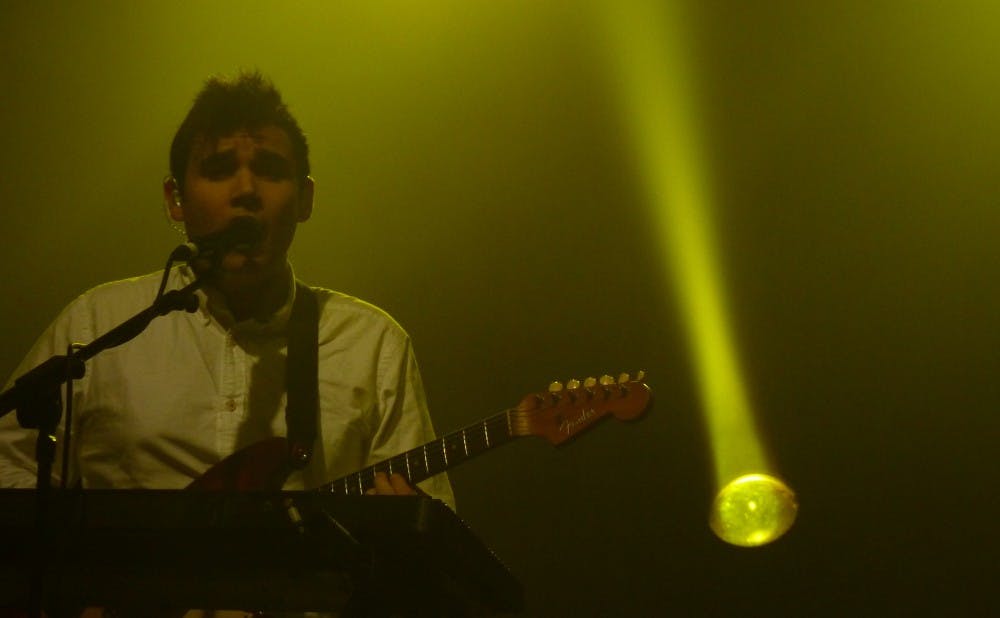The first chapter in Rostam Batmanglij’s journey as a solo pop artist offers all the instrumental mosaicking, elusive vocals and personal content he needed to jumpstart his own musical brand. Released Friday, Sept. 15, “Half-Light” issues from the blurry place of Rostam’s memory and reflection; he communicates with the listener through the abstract and emotive.
Followers of the artist and producer have been anticipating his solo album since he famously departed Vampire Weekend in 2016, releasing his first individual work with with former Walkmen singer Hamilton Leithauser the same year (“I Had a Dream that You Were Mine”). The indie-baroque pop-meets-worldbeat sound that characterizes Vampire Weekend’s first three albums largely owes itself to Rostam’s ingenuity, which echoes in his solo work—but by no means defines it.
From his start, Rostam played musical renegade within the indie-pop genre, experimenting with auto-tune, discrepant meter and international music. His identity as a gay, first-generation Iranian-American immigrant in the largely white, straight genre blazed a trail for similarly diverse artists, and his work with the likes of Solange and Carly Rae Jepsen has proven his dexterity in adding new character to pop.
As expected, Rostam plays with the limits of pop in “Half-Light,” riffing off the ornament and intelligence of Vampire Weekend for a sound that’s gloriously layered and distinct—and maybe a little fussy at times. Major themes include a focus on percussion and ambient vocals, showcased in opening track “Sumer,” where indistinct choirs fume beneath the chime of sleigh bells and rhythmic drumming. But the treated vocals that enhanced Vampire Weekend’s “Ya Hey” and “California English” don’t always work in Rostam’s favor. The heavily auto-tuned voices behind “Hold You” clash with its unstable, trap-esque high hat, making for a staticky and vaguely irritating mess. Moreover, the cool rhythm of “When” gets interrupted by alien-like ramblings that are more mechanical than choral.
Rostam breaks away even from his own sounds, showcasing a menagerie of genre samplings as if simply to prove that he can. “Rudy” at once poses a reggae groove and all the wildness of a jug-band, tied together by Rostam’s wavering vocals that gain momentum in step with the instruments. “Wood,” which was released as a single in 2011, also stands completely on its own; the festival gaiety of invigorating Eastern beats enlivens the message of love’s warm beginning. Meanwhile, “Don’t Let It Get to You” closes with all the orchestral flutter that winds and strings can offer.
A far cry from the calculated architecture of Vampire Weekend lyrics, Rostam cuts his words down to the Poundian essentials. He craft nebulous images—set in half-light, if you will—so as to invite listeners into a shared awareness of the love and heartbreak, memory and self-reflection that serve as the album’s driving themes. As “EOS” reverberates with celestial vocals that blur the track’s sense of tempo, Rostam’s echoing voice recounts a poignant memory with abstract lines like “Along the coast we could see time and space / And across the water it was all emptiness” or the plaintive “Lo and behold you were here now you're gone.” Moving from Rostam’s vault of memories into the present, closing track “Gwan” is an experiment in self-reflection studded with broadly open lines like “Don’t listen to me, I only believe myself.”
But beyond its honest, universal lyrics, “Half-Light” is steeped in vulnerability—Rostam’s vocals tell more of the story than his words do. In “Bike Dream,” Rostam struggles with a frustrating dual sense of self-assurance in love, but his lilting, nearly giggling tone belies a sighing acceptance of himself. The mood takes a sharp turn in “Gravity Don’t Pull Me,” where Rostam’s voice yields to painful breaks and sharp cries through lines like “So I bite my lip and I hold my tongue / And I wait for the pain to be gone”
The jewel of this album is its namesake, “Half-Light.” The refreshingly simple chords ebb and flow under Rostam’s lament of rejected romance, giving way to a haunting refrain by Wet’s Kelly Zutrau. As Rostam’s dreamlike image of “somewhere in the half-light” comes to define the tragic place between love and the acceptance of its end, he offers one of the painful and fully transparent self-portraits that gives the album its worth.
As an independent artist, Rostam retains the avant-garde style that gave his former group a name. But “Half-Light” does more than make sitar sound pop—it exposes the heart of the artist, nobly unfettered.
Get The Chronicle straight to your inbox
Signup for our weekly newsletter. Cancel at any time.

